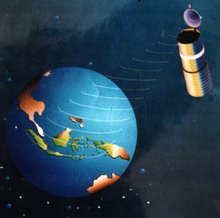Saturday, March 1, 2008
Wednesday, April 4, 2007
Big Brother Gone Mad
When it comes to cctv surveillance, Britain is the most highly monitored country in the world. There is one cctv camera for every 14 Britons and it's estimated that every individual in Britain is captured on cctv about 300 times daily. Even George Orwell's former home is being watched. Now the government is considering making a new addition to its surveillance arsenal: talking cameras. Trials of the new technology were used to tell litterbugs to pick up their trash and to convince gangs to disperse. Who gets to give the orders? According to this article in the Guardian, "Competitions are being held at schools...for children to become the 'voice' of CCTV cameras."
Monday, March 26, 2007
The Ethical Imagination

CBC Radio is rebroadcasting their 2006 Massey Lectures entitled "The Ethical Imagination". Catch it this Monday to Friday at 9pm on CBC One Radio (99.1)
"Science and technology confront us with some of the most challenging and unprecedented ethical questions in the world today. These issues encompass what it means to be human, how we relate to others and our world, and how we find meaning in life. In the 2006 Massey Lectures, The Ethical Imagination, Margaret Somerville discusses how we can find a shared ethics for an interdependent world."
For more information: http://www.cbc.ca/ideas/massey.html
Tuesday, March 6, 2007
China targets internet cafes
I came across this article just after our class and it ties in to our discussion around Schull's article, dealing with addiction and gambling, in relation to internet use.
http://www.cbc.ca/technology/story/2007/03/06/tech-china-cafe.html
It seems in this case, rather than the responsibility and blame being put on the individual, the more abstract entity of the internet and its use is being blamed for a number of problems, and China is taking paternalistic measures to protect its citizens.
http://www.cbc.ca/technology/story/2007/03/06/tech-china-cafe.html
It seems in this case, rather than the responsibility and blame being put on the individual, the more abstract entity of the internet and its use is being blamed for a number of problems, and China is taking paternalistic measures to protect its citizens.
Tuesday, February 27, 2007
AEI vs. the Academy on Gore

After the conversation in class today I came across this article that actually makes a direct link between the American Enterprise Institute (which I mentioned) and Gore. It seems that today a thinktank linked to the AEI launched a smear campaign against Gore to try to undermine all the positive publicity he received as a result of winning an Oscar. The AEI is heavily funded by ExxonMobil, a company that Gore singled out in his Toronto speech as being particularly cynical in its attempts to misrepresent the facts about global climate change. Presumably Gore has been saying the same thing at his other speeches too. Now ExxonMobil is fighting back but via its proxies (thinktanks, institutes, columnists, etc.).
The website that published the article I link to above is the Huffingtonpost, the most popular news blog on the web. It has a liberal editorial slant and Huffington herself is a key supporter of the campaign for a Gore presidential run. You probably know that the producer of An Inconvenient Truth was Laurie David (married to Larry David), also a Gore supporter and an occasional contributor to Huffingtonpost.
Arianna Huffington, Laurie David, the Academy, and Al Gore are on one side of the battle line. ExxonMobil and its proxies are on the other side. There could be a lot at stake: the American presidency and the climate of public opinion surrounding the climate change issue. In the long run, or perhaps medium-run, how this battle resolves could also have an impact on whether green technologies such as electric cars are promoted or whether they are "killed."
Saturday, February 10, 2007
Web 2.0
here is a video my friend showed me on youtube. it was created by some anthropology students at a university in the states. its composition is pretty interesting.
http://www.youtube.com/watch?v=6gmP4nk0EOE
http://www.youtube.com/watch?v=6gmP4nk0EOE
Friday, February 9, 2007
An iPod Identity Crisis
Sometimes the struggle over the definition of the meaning of an artifact takes place within the arena of law. Here in Canada, the Copyright Board will soon consider a request by members of the music industry to define MP3 devices such as iPods "audio recording media" rather than playing devices. In other words, they want to argue that MP3 devices are equivalent to cassettes or CDs, not to Walkman's or CD players. They then want to have a fee levied on the sale of such devices to compensate artists and music labels for the illegal use of their music. So it appears that the iPod is having a bit of an identity crisis. As one observer put: “They're really getting quite existential here. They're asking the copyright board to look into the soul of an iPod and determine its true identity.” Check out the whole story in the Globe.
Saturday, February 3, 2007
John Berger on the Bicycle
We're all very familiar with Pinch & Bijker's excursus on the "social construction of the bicycle." But what would a more phenomenological take on the bicycle be like? Here is what John Berger (who also writes about the photograph) has to say about his addiction to bicycling:
"Because you are on two wheels and not four, you are much closer to the ground. By closer I mean more intimate with. Take the surface of the road. You are conscious of all its possible variations, whether it offers a grip or is smooth, whether it's new or used, wet, damp or dry, where there's mud or gravel, where ruts are being worn - all the while you are aware of the hold of the tyres or their lack of it on the varying surfaces, and you drive accordingly.
Bends produce another intimate effect. If you enter one properly, it holds you in its arms, just as a hill points you to the sky and a descent receives you. And speed is of the essence. By this I do not necessarily mean the speed at which you are travelling. The reading on the speedometer is a small part of the story.
The fastness that counts most is that between decision and consequence, between an action and its effect - changing direction, braking or accelerating. Other vehicles may in fact react as quickly or more quickly than a motorbike, but a jet plane, a highly tuned car, a speedboat are not as physically close to your body, and none of them leaves your body so exposed. From this comes the sensation that the bike is responding as immediately as one of your own limbs - yet without your own physical energy being tapped. And this effortless immediacy bestows a sense of freedom."
The use of an old technology to restore a sense of immediacy that was destroyed by (slightly) newer technologies, like the car, the motorbike and the jet plane.
(For more about examples of some famous intellectuals' guilty pleasures, see this piece in the Guardian).
"Because you are on two wheels and not four, you are much closer to the ground. By closer I mean more intimate with. Take the surface of the road. You are conscious of all its possible variations, whether it offers a grip or is smooth, whether it's new or used, wet, damp or dry, where there's mud or gravel, where ruts are being worn - all the while you are aware of the hold of the tyres or their lack of it on the varying surfaces, and you drive accordingly.
Bends produce another intimate effect. If you enter one properly, it holds you in its arms, just as a hill points you to the sky and a descent receives you. And speed is of the essence. By this I do not necessarily mean the speed at which you are travelling. The reading on the speedometer is a small part of the story.
The fastness that counts most is that between decision and consequence, between an action and its effect - changing direction, braking or accelerating. Other vehicles may in fact react as quickly or more quickly than a motorbike, but a jet plane, a highly tuned car, a speedboat are not as physically close to your body, and none of them leaves your body so exposed. From this comes the sensation that the bike is responding as immediately as one of your own limbs - yet without your own physical energy being tapped. And this effortless immediacy bestows a sense of freedom."
The use of an old technology to restore a sense of immediacy that was destroyed by (slightly) newer technologies, like the car, the motorbike and the jet plane.
(For more about examples of some famous intellectuals' guilty pleasures, see this piece in the Guardian).
Friday, January 26, 2007
US Government as Vandal? Another Wikipedia Controversy

Wikipedia is no stranger to controversy. The giant, community-authored wiki encyclopedia is a lightning rod for heated debates about the pros and cons of open and publicly editable online knowledge bases and about the web in general. I discussed one such controversy, involving Britannica and Nature, here. That scuffle seemed to come out more or less in wikipedia's favour. For a contrarian's view on wikipedia and a defense of the ivory tower, see Nicholas Carr's take on what he regards to be the naive religiosity of those who believe in the power of Web2.0. Carr is one of the most interesting bloggers writing about new IT technologies (even if his thinking is often wrong-headed). Whatever one's perspective, it's clear that many people are captivated by wikipedia's apparent power. Even the US government is getting in on the action. In doing so it has found itself branded as a vandal. The Politico blog has that story.
Monday, January 22, 2007
Which Came First? Liquid rocket fuel or frozen food?

Sometimes it's good to have a sense of the order in which things appeared on the scene. While one must always be critical of the idea of invention, it is nonetheless interesting to see the dates on which certain devices are said to have had their origins. This is a good resource for that kind of information. (Are there any 'feminine technologies' on the list?)
Friday, January 12, 2007
Steve Jobs, you've done it again
check the new iphone.
http://www.cbc.ca/technology/story/2007/01/09/apple-jobs.html
http://www.cbc.ca/technology/story/2007/01/09/apple-jobs.html
Monday, January 8, 2007
A New Blog and a New Approach to Traffic

Welcome to this new blog, which is starting out as a collective project of U of Toronto's ANT442 class, a.k.a. Anthropology and New Technologies.
To get started I thought I would draw your attention to one of the more interesting stories I've read recently about new technologies. It takes place in a rather unexpected domain, but one which is dear to my heart: traffic engineering. The story is of a maverick traffic engineer by the name of Hans Monderman. Monderman lives in the Netherlands, where he has worked as a traffic engineer for many years. How can a traffic engineer be a maverick technologist? Learn about it here and here.
What does it mean when governments start eliminating signage and 'downloading' traffic responsibilities on to citizens? Are we ready to fend for ourselves? Is this another example of neoliberal governance or is it an example of enlightened approaches to the balance between human responsibility and delegation to non-human actors (cf. Latour)? (Image from the NY Times)
Subscribe to:
Comments (Atom)
